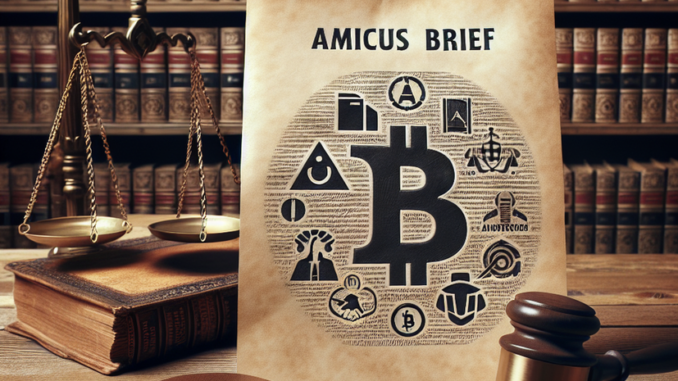
In the face of increasing legal challenges and regulatory scrutiny, the cryptocurrency industry has turned to a powerful tool: amicus briefs. These briefs allow the industry to share its expertise and concerns without getting involved in costly and time-consuming litigation.
A recent case involving the Securities Exchange Commission (SEC) and Coinbase, a major cryptocurrency exchange, showed how the industry is using amicus briefs. During a high-stakes lawsuit, Coinbase received support from the industry with six amicus briefs. This not only showed unity within the industry but also highlighted the importance of engaging with the courts to shape legal outcomes.
The use of amicus briefs in cryptocurrency cases is different from the norm. According to a study by law firm Arnold & Porter, over 900 amicus briefs were filed during the 2019-2020 Supreme Court term, and justices cited these briefs in 65% of cases. Organizations like CoinCenter, Blockchain Association, and Crypto Council for Innovation, as well as venture capital firms like Andreessen Horowitz and Paradigm, consistently submit amicus briefs to influence industry legal precedents.
Judge Katherine Failla of the Southern District of New York recognized the impact of amicus briefs during the oral arguments in the Coinbase case. She mentioned the briefs submitted by several supporting parties who backed Coinbase. This acknowledgment emphasizes the importance of these filings in shaping court decisions.
However, the benefits of amicus briefs go beyond individual cases. An unfavorable legal outcome in one case can set a precedent that affects the entire industry. By actively participating in the legal process through amicus briefs, the cryptocurrency industry can educate judges about the complexities of cryptocurrency technology and address crucial legal questions.
Amicus briefs also provide an opportunity for industry participants to contribute their expertise and resources. Support can come in various forms, including financial resources, expert analysis, and knowledge sharing. The Investor Choice Advocates Network even offers pro bono services to clients involved in SEC actions, strengthening the industry’s legal defense capabilities.
It’s worth noting that not all cryptocurrency companies choose to pursue amicus briefs. Some entities, like Ripple, Coinbase, and Grayscale, prefer full-fledged litigation with the SEC. Litigation can be costly and time-consuming, deterring certain industry participants from taking aggressive legal stances. Nevertheless, amicus briefs offer a cost-effective alternative that promotes industry-wide collaboration and strategic defense.
The significance of amicus briefs cannot be overstated. Smaller entities and individuals facing regulator lawsuits may struggle to afford a robust legal defense. Amicus briefs provide a platform for these entities to pool resources, exchange insights, and present a united front. Waiting for congressional legislation is not a practical solution. The industry must seize every opportunity to educate courts about technology and actively contribute to the legal landscape through amicus briefs.
In conclusion, amicus briefs have become a powerful legal defense strategy for the cryptocurrency industry. By utilizing these filings, industry participants can shape legal outcomes, influence precedents, and educate courts about the complexities of cryptocurrency technology. With the number of cryptocurrency-related cases increasing, the importance of amicus briefs cannot be overstated. The industry must continue to proactively engage with the courts, providing resources to defendants, and contributing expertise to ensure a fair and well-informed legal environment for all.

Be the first to comment